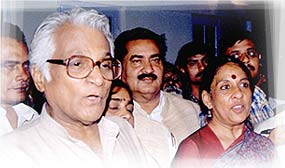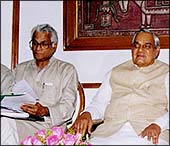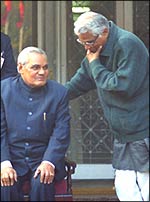The Rediff Special/ Savera R Someshwar


Associate Editor Savera R Someshwar meets George Fernandes's associates in Bombay to find out what they think about the former defence minister and the controversy that swirls around him.
There is immense regret, even sadness. "Where has he (George Fernandes) gone? To what extent?" asked Ahilya Rangnekar, former member of Parliament and an old associate of the man who resigned on Wednesday evening as India's defence minister.
"It is horrible! Horrible! At first I did not believe it," says the octogenarian Marxist. "This kind of thing... I could have never imagined it. But now, after all the proof, what choice does one have? If you did it for anything else... but defence? You know the [consequences] of your action. Even then? That means you do not care for your country!"
Union leader Sharad Rao is dismissive of the charges against an old friend. "George is absolutely above board. I have known him since 1962; there is no way he can be involved. He is the man who has always tightened the noose around corruption in any form. That has not changed."
"My God!" laughed Congressman Prabhakar Kunte, a former minister from Maharashtra. "These are ridiculous times; this is a ridiculous government. And George Fernandes is a national disaster. I have known him for 50 years. I have seen his career. I know what he is."
Three reactions. Yet, they are, within themselves, representative of how those who know, or once knew, George Fernandes feel about the tehelka.com exposé on the murky world of defence procurements. And, in particular, about its impact on the former defence minister.
This was the man who could inspire huge crowds in the 1960s with his eloquent rhetoric. Who could bring India's financial capital to a standstill with one call: Bandh. Who was anointed 'George the Giantkiller' after he defeated Congress strongman S K Patil in the 1967 Lok Sabha election. Who was unfazed by police brutality. Who violently registered his protest against Indira Gandhi's Emergency. Who, it seemed, refused to deviate from his avowed path even when repeatedly thrown into jail.
These are documented facts.
There is, say others who have spent decades with him, a murkier side to this tale. A side that is not spoken about. It encompasses a greed for power. A tendency to destroy any barrier to personal ambition. A ruthless focus on the end, with disregard to the means to reach there. This, they say, is the real George Fernandes.
Among the numerous stories revolving around Fernandes is one that talks of how he helped Veerendra Patil take on Indira Gandhi in Chikmagalur, Karnataka, in the famous 1978 by-election. In one of the violent incidents that marred electioneering, a 20-year-old student called Gayatri was killed. Some of Fernandes's associates were appalled at this unexpected turn of events.
 "I did not know Sadanand Menon (a Fernandes associate at the time) then," recalls Kumar Ketkar, who spent three weeks covering the contest for The Economic Times. "When we met a few months later, he told me George was pleased with what had happened; he believed it would help their campaign immensely. He told Menon: 'If she had not been killed, we would not have been able to mount this kind of tension.' "
"I did not know Sadanand Menon (a Fernandes associate at the time) then," recalls Kumar Ketkar, who spent three weeks covering the contest for The Economic Times. "When we met a few months later, he told me George was pleased with what had happened; he believed it would help their campaign immensely. He told Menon: 'If she had not been killed, we would not have been able to mount this kind of tension.' "
"He has always encouraged violence," alleges another long-time associate, speaking on condition of anonymity. "He is power-driven and merciless when it comes to his goals. He would like to finish off his opponents."
But those who are pro-Fernandes speak about his compassion. They highlight his regular visits to meet soldiers posted on the Siachen glacier; his attempts to boost the morale of the armed forces. They discuss his intimate knowledge of the life of the urban poor; of life on the streets. They talk of how, on his first night in Bombay, in July 1950, he found himself woken up with a kick from a furious stranger. Fernandes, it seems, had unwittingly taken over the vagrant's spot on the pavement.
"He has lived that kind of life. He knows what it is to be poor, so he fights passionately for the poor," says A L Quadros, who heads the Bombay Taximen's Union.
Which is why they cannot believe "a man of such integrity and honesty" is involved in any murky defence scandals.
"George," says Sharad Rao, "is upright and non-corrupt. His simple way of living is testimony to that. Corrupt people don't live like George does. He lives without fear. Look at George's house, it is open to everyone. No one has to go through any security to reach him. Because he is so open, anyone can walk to his house and leave bags containing crores of rupees there. Does that mean he is corrupt?"
Mrinal Gore, yet another associate from the erstwhile Socialist Party, would only say, "Mujhe nahin lagta aisa kiya hain (I don't think he has done anything like this)." But when asked if she thought he was honest, the former MP politely refused to discuss the subject. "Main nahin bata sakti... (I cannot say...)"
Others are not so reticent. They point out how, when Fernandes moved base from Bombay to Delhi, he gave up his two-room rented flat at Kemp's Corner. How, when the Municipal Mazdoor Union bought a house for him in Hauz Khas in New Delhi, he insisted it be registered in the union's name. How, when many union leaders register union assets in their names, Fernandes made sure that all the MMU and Bombay Labour Union assets were only registered in the unions' names. That the only asset he ever had, the house that belonged to his father, now belongs to a charitable trust.
Ketkar is not convinced. "George has this enormous ability to fool people," says the editor of the Marathi daily, Maharashtra Times. "He will not directly take money; he is not interested in personal wealth. He does not have an expensive lifestyle. But his kurta-pyjama has nothing to do with simplicity; it is his USP, he uses it to convince the elite of his integrity. If you are in politics and you are ambitious -- and, believe me, George is very ambitious -- you need money."
Quadros scoffs, "Even when he fought elections, George did not ask any industrialists for money. It has always been funded by donations from the workers -- donations that are as small as Re 1 or Rs 2. And receipts are issued for every donation."
Is that enough, query his detractors? Just winning an election is not the end of the story. "Why did Bangaru Laxman take money?" asks a veteran Socialist. "He took money for his party. But is that right? In today's world, you need money to build up political support. You need money to keep up your power."
And Fernandes, they say, is driven both by power and ambition.
When he was in Bombay," says Nikhil Wagle, editor, Mahanagar, the Marathi evening newspaper, "he was a very honest leader. He genuinely felt for the labour class. He has seen a lot of hardship. When he first came to Bombay, he survived by doing petty jobs in hotels and sleeping on the streets. Then, in 1967, he contested against S K Patil. That victory was the beginning of the downfall of a bright and honest leader."
"George is extremely ambitious," says Ketkar, once a self-admitted admirer who also worked for him. "He does not care for his cadre or his colleagues. He has a set aim and his only concern is to achieve it, never mind the cost. In those days if, for example, he organised a morcha and it turned violent, he would do things that would invite a police firing -- and if four or five people died -- the ensuing publicity would please him; he could manipulate it for his benefit."
Charges Kunte: "George has fallen from his high pedestal. He has betrayed the Socialist movement. In the last 10, 15 years, a sea change has come over him. He has become a power-seeker. He does not care about the means, he just wants power."
Narayan Phenany, who heads the BEST [Bombay Electric Supply and Transport undertaking] Workers' Union in Bombay, wonders why his ambition should be held against Fernandes. "What is wrong in being ambitious? If he was not ambitious, he would not have achieved what he has in the trade union field. What is wrong in being interested in politics? Is it a crime? He knew that certain issues could only be resolved by politicians or by using political influence.
"Look at his achievements as a minister, look at his grasp of things. When he was industry minister in Morarji Desai's Janata Party government he made an attempt to decentralise industry by insisting that every district in the country must have an industrial cell. When he was railways minister, he connected the country -- from Delhi to Kanyakumari -- by rail. When he was defence minister, he tried his best to introduce transparency and accountability in the ministry."
 Concurs Sharad Rao. "Everyone remembers Kargil. But how many people remember what he did for the salt workers of the country?"
Concurs Sharad Rao. "Everyone remembers Kargil. But how many people remember what he did for the salt workers of the country?"
Phenany and Quadros agree, though they are not too happy with his decision to align with the Bharatiya Janata Party.
Says Quadros: "Personally, I don't agree with George joining the BJP. But he had his own compulsions -- the politics of Bihar (from where he has won election to the Lok Sabha since 1977) and the pressure from his party people to become a minister."
But Kunte refuses to mince words. "He started as a Socialist. Where is he now?" he asks. "He claims to be a disciple of Dr Lohia. Where is that philosophy now?"
His critics, however, agree he has strong leadership qualities. That he injected new life to the city's labour movement. That he gave impetus to what are among the largest unions in Bombay today -- the Municipal Mazdoor Union, the BEST Workers' Union, the Bombay Taximen's Union, the Bombay Labour Union, the Rail Mazdoor Union, the Dock Workers Union...
"He was very brave," says Ahilya Rangnekar. "He never cared for his life. He would face police lathi-charges without fear."
Ketkar says, "His networking ability is superb and he has a great memory. He would call activists by their first names. He was great at mobilising people and would adapt to slum life easily. He was a great actor -- even though he had no sense of compassion, he could easily break down in public. He had immense energy; he could take to the streets at a moment's notice, he could talk easily to people. He is extremely intelligent and well-read and has a felicity for languages. He is fluent in Kannada, Telugu, Tulu, Marathi, English, Hindi and Gujarati."
The present cloud over Fernandes does not worry his friends.
"George has this knack," says Sharad Rao comfortably, "of coming back, even when everyone thinks he is finished. People have been daydreaming of finishing him for ages. But Fernandes is Fernandes. He will come back."
Ketkar is not so sure. "If he was 50, he would have bounced back. But his health is failing him now; recently, he underwent a brain operation. That does not mean he has given up. George just does not know how to do that."
Design: Dominic Xavier
The Complete Coverage | Defence sites
Back to top
Tell us what you think of this feature